#Hws Tajikistan
Explore tagged Tumblr posts
Text






central asia chibi pfps done!!! YIPPEEEE
left to right, top to bottom (miss uzbekistan belongs to @itstokkii):
kazakhstan
uzbekistan
turkmenistan
kyrgyzstan
tajikistan
uyghurstan/east turkestan
#hetalia#hetalia ocs#historically inaccurate hair is historically inaccurate#aph kazakhstan#aph uzbekistan#aph turkmenistan#aph kyrgyzstan#aph tajikistan#aph uyghurstan#hws kazakhstan#hws uzbekistan#hws turkmenistan#hws uyghurstan#hws kyrgyzstan#hws tajikistan#cd pfps
130 notes
·
View notes
Text

sketch of kyrgyzstan and tajikistan
some time last year kyrgyzstan changed their flag after some guy pointed out the wavy rays on the sun in the middle made it look like a sunflower, a symbol of subservience in kyrgyz culture
old one on the left, new one on the right (the new one kinda looks more like a sea urchin than a sun tbh)


27 notes
·
View notes
Text

finally...a group picture of the siblings!!
O'RTA OSIYO OLG'AAAAAAAAAAAAAAAAAAA
#hetalia#aph uzbekistan#hws uzbekistan#aph kazakhstan#hws kazakhstan#aph kyrgyzstan#hws kyrgyzstan#aph turkmenistan#hws turkmenistan#aph tajikistan#hws tajikistan#tokki draws
43 notes
·
View notes
Note
Who are your siblings and what is your relationship with them?
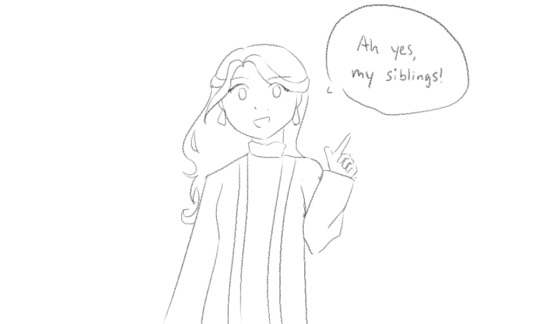
You could say I'm the literal middle child of my family, given that I share a border with all my siblings. So in a sense...I'm the center of Central Asia!


Kazakhstan is my younger brother! He's known for his nomadic history years back, falconry, and for being the space hub of the now dissolved Soviet Union.
Yuri Gagarin, the first man to ever go to outer space, was launched in Baikonur, Kazakhstan. A little after his independence, Kazakhstan created his own space program, and enjoys keeping up to date with the latest news on space exploration and astronomy(NOT astrology), and won't hesitate to tell you about it. Please listen to him, his eyes light up like stars when he speaks.
Linguistically, he's the closest to Kyrgyzstan and then me. Though due to sharing a border with Russia, he's lost a lot of his language and tends to use more Russian loanwords.
He's great at horseback riding, given his nomadic history from years back. He, like Kyrgyzstan, loves fermented mare's milk, called kumis! And he also loves eating horse meat. Don't knock it till you try it!
He's the "face" of Central Asia, and has been insistent on us Central Asians working together as a team under regional unity(ironic since he declared independence from me way back when I was the Bukharan Khanate...).
Since borders have never really been concrete in Central Asia(not until the Russians came, that is...), there's a significant ethnic Uzbek population in the south of Kazakhstan, namely in places like Turkestan and Shymkent.
He's also been the most modernized Central Asian nation, and talks to Russia the most, whether he likes it or not(he doesn't). Regardless, I really do admire him for being the "trailblazer" representing the rest of us Central Asians.
However, bearing the brunt of all this comes with its drawbacks. I better get him to stop smoking at some point...
Also. Don't ever talk about B*rat in front of him. America made the mistake of doing that once.

Then we have my older brother Kyrgyzstan. He's... a handful. We've had a history of border disputes that only recently resolved, involving our diasporas in each other's regions. There's a large population of Kyrgyz-Uzbeks in Uzbekistan, and a population of Uzbek-Kyrgyz in Kyrgyzstan.
He's dependent on me for fuel and gas...so my old boss used to turn off pipelines or put off delivery time periods as a way of getting what he wanted.
But we have our moments where we get along now and again. We both worked together in the Basmachi Revolt of 1917 to fight against Imperial Russia. However, it failed when the Russians tried to increase nationalism in each of our regions to split us up... what with calling Uzbeks more "civilized" and "sedentary" than the "nomadic" Kyrgyz.
The both of us are also rather religious and sometimes nag our other siblings(Kazakhstan i mean Kazakhstan) into cutting down their vodka intake(Kyrgyzstan can't resist kumis though...it's his soft spot. What a hypocrite). We also jump Kazakhstan every time he uses a Russian loanword when he could've used a native word.
There have been moments where I was in control of some parts of his territory under the Emirate of Kokand...until he successfully broke away from my rule. Hmph.
I do admire how Kazakhstan and Kyrgyzstan both are very outspoken and are able to protest at all...something I don't have.
He, like Kazakhstan, also enjoys horseback riding, and is good with blacksmithing. And he enjoys eavesdropping on Tajikistan and my gossip... he tries to play it off like he doesn't care, but I don't buy it.
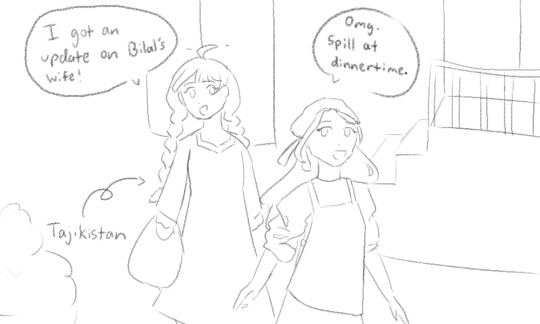
My sister Tajikistan is a very bubbly person. We're both very much alike. A lot of Tajiks look like Uzbeks, and vice versa! There's also a lot of Uzbeks and Tajiks living across our borders. However, as border sharers do, Tajikistan had tension with me and Kyrgyzstan for a while, especially during my former boss's tenure...
That weird sproingle on her hair is a result of years of Persian influence, what with sharing a border with Iran. That's why she's kind of the odd one out. She speaks Persian instead of a Turkic language like the rest of us, but her script is in Cyrillic because of Russian colonization, so she kind of sticks out among Iran and Afghanistan.
And like with Kyrgyzstan and Kazakhstan, I also controlled parts of Tajikistan under the Bukharan Khanate...
(Can you stop flexing with your whole "I ruled over all of you guys" thing? It's super annoying. Thanks ❤️ -T)
Tajikistan, stop hijacking my blog!
Anyway, when she's not gossiping with Turkmenistan and I, she loves decorating the sleeves of her dresses with elaborate embroidery and blasting Persian songs on full volume.
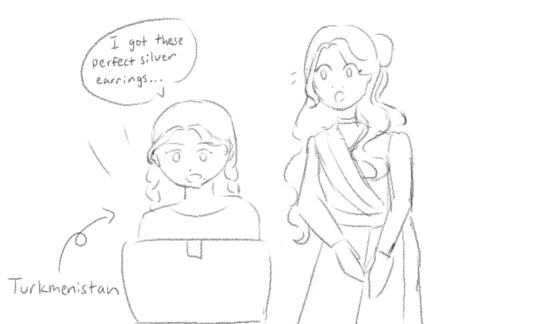
Finally, my other sister Turkmenistan! A lot of people don't know much about her and she definitely does tend to keep to herself more. She's most famous for...how weird her bosses can be. She gets awful tired of her boss sometimes. She had to record a video of him rapping once! Kazakhstan and Kyrgyzstan can't get enough of it, they've made up games and bets on what Turkmenistan's boss will make her do next...
Ashgabat is really pretty...it just seems a bit lonely at times. Speaking of pretty, Turkmenistan has a long history of ornate headwear and jewelry. She knows a lot about jewelry, especially silver, and we'll talk about our pretty pieces sometimes! I know I can count on her to find something for me to wear on weddings and other special occasions.
Linguistically, she's closest to Turkey and Azerbaijan. A lot of her people go to Turkey to study at Turkish universities, and for travel. Turkey's trying to get her to join the Organization of Turkic States as a member instead of an observer state. It's still up in the air on what she'll do...
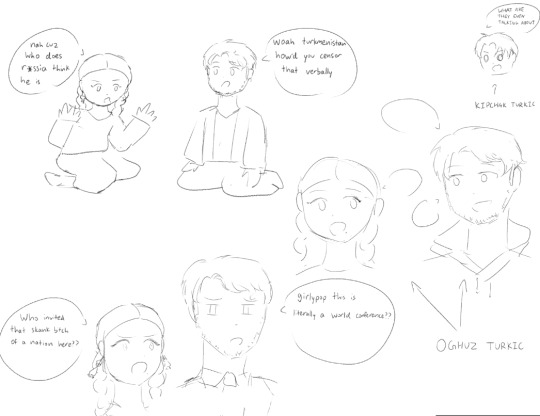
Those are all my siblings! I hope this helped!
#ask#aph uzbekistan#hws uzbekistan#aph kazakhstan#hws kazakhstan#aph kyrgyzstan#hws kyrgyzstan#aph tajikistan#hws tajikistan#aph turkmenistan#hws turkmenistan#first post!! i hope you all like it!!
38 notes
·
View notes
Note
I would love to hear more on, Mongolia's children? Ilkhanate and all the others.
But I would really love to hear is more about the central Asians!
Thank you for your ask. I'll take this opportunity to talk more about IIkhanate/Chagatai Khanate and their relationship with Mongolia as I don't think they get much attention, the Golden Horde and Kazakhstan, and then the Central Asians.
I would really like to thank @peonycats for their help with the Central Asian section!
With Ilkhanate: I think Ilkhanate's relationship with Mongolia was a little strange, but part of it can be chalked up to the fact that it followed traditional structures within Mongol culture in father-son relationships. Typically in Mongol culture, the youngest son would be kept closest to the father/parents, whereas the oldest would inherit the father’s land furthest away from them (golden horde). The youngest son would be called the Otchigen, meaning "prince of the hearth", being kept close to his parents and being expected to take care of them. With IIkhanate being the youngest, this tradition was reflected in his relationship with Mongolia. IIkhanate - out of his 2 brothers, not only was the youngest born but also the youngest in terms of establishing his Khanate, with the Golden Horde and Chagatai Khanate establishing their rules in 1226/7, and the IIkhanate in 1256 after the conquest of Baghdad under Hulegu Khan. This means that Ilkhanate had alot more time with Mongolia personally before he was sent off officially to govern his own lands, and additionally because of his status as the "prince of the hearth" being the youngest, Mongolia was more emotionally involved with Ilkhanate compared to his brothers. I'll elaborate on their relationship a little more later.
The Ilkhanate was a result of the Great Khan at the time (Mongke) sending Hulegu (his brother) out to the middle east to conquer it. Despite plans of Hulegu returning to the Mongolian heartland after his expedition to the East, he stayed and established the IIkhanate. It is thought that this was the plan all along.
It is my headcanon that the golden horde, chagatai khanate and ilkhanate were born some years before the official establishment of their khanates because they were representatives of the lands that Chinggis Khan's sons would inherit, as per Mongol tradition which is in turn reflective of what lands Chinggis assigned to each of his sons in the year 1219, just before the invasion of the Khwarezmian Empire. In 1219, Empress Yisui convinced Chinggis that he needed to choose an heir before the invasion of the Khwarezmian empire. He agreed, and chose Ogedei, his third son, as his heir, leaving Jochi (his eldest) and Chagatai (his second eldest) inheritance to their own lands in the future after his death and Tolui, his youngest, to act as the Otchigen.
You're probably wondering why Chinggis did not choose Jochi, his eldest, to become the next great Khan. This was for quite a few reasons.
Between Ogedei and Tolui, the two youngest, both were the strongest candidates to become the great Khan/heir/who Mongolia would accompany. This is because Mongol succession tradition was ultimogeniture, meaning that the youngest born had the position of inheriting their parent's wealth. Jochi and Chagatai were already cut out of the inheritance race for various reasons including the fact that they were the eldest and because of this, they did not have succession privilege, but ultimately electing either one of them could be a recipe for disaster in the future considering how much they hated each other.
So it was left between the two youngest - Ogedei and Tolui, either one of them could have been the next Great Khan and ruler of the Mongol Empire/who Mongolia would be accompanying/ruling alongside. In the end, Ogedei was chosen as he was seen as fair tempered and generous.
Now that it was official that Ogedei was to become the next great Khan, and that Jachi and Chagatai would be given their own domains to rule over once Chinggis died (still answering the Ogedei, as he would be the great Khan, of course), this meant that the representatives of Jochi and Chagatai's future domains would begin to be born. I headcanon that Jochi's future ulus (kingdom), the Golden Horde, was born in the year 1219, and Chagatai's ulus was born one year afterwards in 1220. I gave them a one year age difference to reflect the one year age difference between Jochi and Chagatai themselves.
From now on, I'll begin to refer to them using their human names.
Ogtbish = Golden Horde
Khenbish = Chagatai Khanate
Khunbish = Ikhanate
I won't exclusively refer to them as their human names however just for reference, if I say "Ogtbish" for example lam referring to Golden Horde.
Golden horde, the first born, represented future Jochid land (the Golden Horde was ruled by Jochid Khans), the Chagatai Khanate represented future Chagataid land (ruled by the Chagataids) and lastly, the IIkhanate represented future Hulagu/Toluid land (I say Toluid lands because the IIkhanate was ruled by Toluids because of Hulegu, who was a son of Tolui. It should be noted that the heartland of the Mongol Empire, later the yuan dynasty who Mongolia himself represented also became ruled by Toluids after the death of Guyuk Khan who was the son of Ogedei, and Mongke Khan took over. He was the first Toluid Khan.)
Now this begs the question, what about IIkhanate? When was he born? Wasn't the Ilkhanate established later in the late 1250s?
That would be correct. However | see IIkhanate as being born in 1224, and here is my reasoning:
1) The future ruler/establisher of the IIkhanate, Hulagu (grandson of Genghis and son of Tolui) was already born by this point (born in 1217), and just like how the Golden Horde and Chagatai Khanate were ruled by Jochi and Chagatai's bloodline, the IIkhanate was ruled by Hulagu's bloodline.
2) The IIkhanate was originally based off of the Mongol invasions of the Khwarezmian Empire that lasted from 1219-1224. Strong Mongol rule was later consolidated in 1256 by Hulagu Khan, however it was based off of these original invasions.
3) So, two foundations of the IIkhanate, the future ruler and the original invasions it was based off of, were in existence by 1224. The first foundation may be a little more mystical in nature however even without the first reason, the Ilkhanate being based off of those original invasions is enough justification for me to make him be born in 1224.
So, the official birth dates in my canon:
1219: Ogtbish (Golden Horde)
1220: Khenbish (Chagatai Khanate)
1224: Khunbish (Ilkhanate)
The Golden Horde was officially established in 1227, ahd the Chagatai was officially established in 1226, one year before. The fact the Khenbish had his ulus established one year before his eldest brother definitely gave him a further sense of superiority over his brother. I'll elaborate on this later when I talk about Khenbish specifically.
It is my canon that Ogtbish and Khenbish were officially released to their lands by 1235/6 despite the fact that the Golden Horde and Chagatai Khanate were established in 1227/6. This doesn't mean they were completely cut off from the ongoings/politics of their lands, and they were allowed frequent visits, however they were kept back temporarily in a bad attempt on Mongolia's part to instil a sense of supremacy over them. To teach/remind them that despite the fact that they had their own domains, that they would always answer back to Mongolia/the Great Khan. As Jack Weatherford describes in "Genghis Khan and the making of the modern world", Chinggis only began to realise nearing the end of his life that he should have been more present of a father, and desperately tried to get his sons (particularly Jochi and Chagatai) to get along by sending them on joint military campaigns for example as a way of mending their relationship and teaching fhem the importance of unity, along with a load of other life lessons. The siege of Ugrench for example lasted for months longer than it should have because Jochi and Chagatai kept on sabotaging each other. Similarly, holding them back was a failed attempt on Mongolia's part to teach them about unity. Remember that the Mongol Empire split up in the 1260s, and the four Khanates were still functioning as a unit in the 1230s, hence why I don't think that this headcanon is unreasonable.
Now onto IIkhanate's relationship with Mongolia and what I was previously talking about: Considering the fact that "iIkhanate" literally meant "subordinate/obedient Khanate", that traditionally the youngest son would be kept close to the father and the official establishment of the Ilkhanate as a state was a bit later than his older brothers, llkhanate spent a lot of time with Mongolia personally. Mongolia was quite sticky towards IIkhanate in particular, especially when his eldest sons would fight with each other and then with him.
Before being released to his own domain, Ilkhanate took on a similar supportive role that Tolui did, and acted as kind of an assistant/administrator for Mongolia. He was certainly very keen on doing a good job. His older brothers on the other hand thought he was quite pathetic and spoiled - they had bigger responsibilities pushed onto them earlier than he did after all.
From Christopher Attwood, a prominent historian on Mongolia "The dynasty's traditional foreign policy revolved around three rivals, Mamluk Egypt, the Golden Horde, the Chagatay Khanate, and one ally, the Yuan Dynasty."
One ally. The Yuan Dynasty (Mongolia.)
The Mongol empire, after breaking into 4 parts in the 1260s, never collaborated closely with each other again. In fact, the different Khanates began fighting each other (much to Mongolia's chagrin because wtf I'm your father why aren't you listening to me stop that-).
That is except, between the Yuan dynasty and IIkhanate. Not only were they allies, but they collaborated with each other on different scientific ventures too. They did eventually lose contact with each other, however the Yuan and llkhanate were closer to each other for a longer period of time than the other Khanates were.
(Quick sidenote, Hulagu Khan actually commissioned an observatory to be built swiftly after the establishment of the iikhanate. I see Ilkhanate as being a bit more reserved compared to the likes of Chagatai Khanate and was the nerdiest out of his brothers. Also fluff headcanon but I think IIkhanate loved astronomy so much because when he was a small child and would cry at night, he'd be taken outside by Mongolia so as to not disturb others and the stars would calm him down.)
The ties between the Yuan and Ilkhanate was so much so that the Yuan dynasty kept suzerainty over the Ilkhans for quite a long period of time. This suzerainty was proclaimed over Ilkhan coinage, there was an active tributary relationship between the IIkhanate and Yuan dynasty, and Ilkhans sought after Yuan/Chinese titles, such as chingsang (grand councillor) and gong (duke).
Because of this, Mongolia saw IIkhanate as sort of a "golden child". He never fought back against him or strayed too far away from him, he always listened to him when he wanted him to, he was the "obedient" one. This was evident even before Mongolia's children flew the nest and they lived under one (felt) roof. Golden Horde and Chagatai Khanate were constantly arguing or fighting with each other, meanwhile IIkhanate was just sitting there in the background. He never gave Mongolia a headache like his brothers did in his earlier years and even in the later years - the yuan and Ilkhanate allied together to defeat Chagataid forces.
This was not necessarily a good thing for IIkhanate. Mongolia was also mentally immature during this time so did not have thie maturity to be a good father figure. This meant that not only could he not properly control the spats that Chagatai Khanate and Golden Horde got into, but he would then use Ilkhanate as a live-in therapist to not only vent about his two eldest not getting along, but also about anything that bothered him at the time really once he realised that IIkhanate pretty much would always hear him out. In this sense he parentified IIkhanate and was an overbearing parent to him, even after the Ilkhanate as an official state was established (previous example: the coinage.)
About the coinage again. There was a period of time when the Ilkhanate tried to kind of break free from Yuan influence instead of deferring to the Yuan all the time. Under Ahmad Khan, the coinage of the iIkhanate would show Islamic inscriptions instead of inscriptions acknowledging the supremacy of the Yuan. However in some areas, it would show both (Islamic on one side, deferral to the Yuan on the other). However after Ahmad Khan, his successor Arghun deferred back to recognising the supremacy of Yuan rule. It is speculated that this move may have been encouraged by Khublai Khan (yuan dynasty emperor) himself. Mongolia was definitely overbearing towards IIkhanate, especially so when the Golden Horde and Chagatai Khanate flew the nest and became "rebellious" (The Kaidu-Qublai civil war, when Kaidu as the defacto leader of the Chagatai Khanate tried to overthrow Qublai, the IIkhanate supporting Qublai/the Yuan, the Esen Buga-Ayubarwada war, when it was Chagatai Khanate vs the alliance of the Yuan and Ilkhanate.)
Under Ghazan of the IIkhanate, there was another attempt at trying to remove the IIkhanate from acknowledging Yuan supremacy all the time when he'd publicly downplay the Yuan's relationship with the Ilkhanate for Islamic codes and laws. Regardless, ties between the Yuan and IIkhanate remained relatively strong.
About the other two Khanates being "rebellious", even throughout all of that "rebellion" (in Mongolia's eyes), IIkhanate always remained an ally, which only further solidified his golden child status. Circling back to the Qaidu-Khublai war, this was essentially the Golden Horde and Chagatai Khanate coming together to repudiate Khublai's status as the great Khan, accusing him of turning his back on Mongol tradition in favour of Chinese laws.
What happened was, when Khublai took the throne as the Yuan emperor, he invited Kaidu, but Kaidu refused. Khublai then urged the Khan of the Chagatai Khanate, Baraq to attack Kaidu. Although Baraq defeated Kaidu, upon discovering that the golden horde sided with Qaidu, Baraq, in turn, joined them. A subsequent alliance was born at the Talas Quriltai of 1269, and down the line, Kaidu became the defacto leader of the Chagatai Khanate. Ultimately, Khublai/the Yuan came out victorious, however during this time, the IIknanate supported the Yuan dynasty as opposed to allying with the golden horde and chagatai khanate against the yuan dynasty. The IIkhanate and Mongolia remained close, and Mongolia was an overbearing parent towards Ilkhanate despite the IIkhanate having pretty much it's own dominion.
IIkhanate found it difficult to socialise and to form alliances. Quoting Christopher Attwood again, "The dynasty's traditional foreign policy revolved around three rivals, Mamluk Egypt, the Golden Horde, the Chagatay Khanate, and one ally, the Yuan Dynasty."
Ilkhanate could only really consider his own father as a Stable/strong ally. To an extent he held some resentment towards his father but not enough to stop him from being needy. Not exactly the healthiest relationship.
Also: Ilkhanate definitely isn't as uh, timid as he is on the surface. The Berke-Hulagu war (Golden Horde vs IIkhanate war) was mainly fuelled by the fact that some Golden Horde princes were executed under Hulagu's watch, apparently because of "sorcery." He was definitely sneaky in his own ways and this showed even when the whole family were still living together. He was quite the snitch.
Ilkhanate:
Favoured youngest child
The more reserved/artsy one
Also the nerdiest one - really liked astronomy
Unhealthy attachment to his father
Somewhat coddled
Sneakier than you think he is
Onto the Khenbish (Chagatai Khanate) I find him interesting. Being the middle child, I think he knew he had to fight more for attention, and resented the attention Ogtbish would get for being the eldest (even if it was only a marginal amount more because Mongolia was very much preoccupied with other things) , especially with the rumours surrounding the parentage of Jochi and golden horde representing future Jochid lands.
He'd tell Ogtbish that he was the adoptees’ ulus and that therefore he had no right to call himself one of Mongolia's sons. He'd instigate a majority of the arguments he had with Golden Horde and probably rubbed in how he was the first to be granted his own ulus officially in 1226 - a year before the Golden Horde despite the Golden Horde being the eldest, under the provision of Chinggis Khan (golden horde gained his own territories in 1227 when Chinggis Khan died.) He always saw himself as more strong-willed than his brothers, and absolutely turned his nose up at Ilkhanate's seeming dependence on Mongolia even after gaining his own lands and being granted dominion over them.
Despite Chagatai Khanate and Golden horde arguably being the most keen on fighting for their father's attention and approval, ironically, ultimately they were the first to explicitly express their disenchantment with their father. Circling back to Kaidu-Qublai war, they believed that their father was abandoning Mongol tradition for Chinese. This situation can be seen as somewhat comedic if you see it as Mongolia's children rebelling against him because they don't like their new stepmom. I digress.
Khenbish was odd. He was very much someone who clung to rules and tradition. This stemmed out of his need for Mongolia's approval - especially over Golden Horde's, so the harder he stuck to the rules, the more he respected tradition, the more (he thought, anyways) his father would appreciate him. So queue his surprise when his father established the “Yuan dynasty" in China and subsequently went through some levels of cultural syncretism with China (different from full on Sinicization). I'd say that Chagatai was a little irked at his leader - Baraq, at seemingly siding with Qaidu only after the Golden Horde Khan sided with Qaidu. Of course there was discontent about Khublai already there however the way things unravelled, it was as if Chagatai Khanate quickly took Golden Horde's side rather than again, the discontent already being there and it seemed like he only spoke out after he found out that Golden Horde had the same opinion. Golden Horde definitely rubbed this in.)
Note: Qaidu was the defacto ruler of the Chagatai Khanate from 1266 to 1301. This did not mean that he was the official Khan of the Chagatai Khanate however he held massive amounts of influence and would appoint Khans himself.
The alliance did not last long. Qaidu defeated a major Yuan army in 1289 in the Khangai range, and managed to briefly occupy Kharakhorum - the capital. Nauruz, a commander from the Ilkhanate, led a rebellion in the same year in Khorasan, starting a succession struggle in the West, which allowed for Du'a's (Baraq Khan of the Chagatai Khanate’s second son) 1295 invasion of Mazandaran into Eastern Iran 2 few years later. Kaidu essentially told Du’a to take advantage of the situation and invade the Ilkhanate in order to spread his influence. This expansionism lead to Qaidu losing support from the Golden Horde.
Ultimately, the Golden Horde stopped supporting Qaidu after Mengu-Temur’s death and his successors, in a peace overture to the Yuan, returned Nomugan. This then urged Qaidu to return Hantum to the Yuan as well.
This was also definitely rubbed in Chagatai Khanate's face by Golden horde as, once again, it seemed like Chagatai Khanate was going along with things just because Golden Horde did it.
I'd say Mongolia was... annoyed, to say the very least when his own two sons went against him and accused him of all people of going against Mongol tradition and his own two sons became a thorn in his side.
Chagatai Khanate really irked him in particular though because not only was he the most incessant in his attacks but Mongolia remembers just how keen Chagatai Khanate used to be when it came to pleasing him, only for him to end up like that. Mongolia found himself to be the most annoyed at Chagatai Khanate and his clingyness to tradition. Not to say that Mongolia himself did not cling to tradition, because that is exactly how the Mongols of the Yuan managed to avoid sinicization and Mongolia was not about to call the Yuan a Chinese dynasty anytime soon. However I guess Chagatai crossed the line in his eyes when he decided to try and dictate to him what he should and shouldn't be doing.
In addition, I think Khenbish held resentment towards his father and brothers because he believed he was given the short end of the stick. Baraq Khan of the Chagatai Khanate in 1269 even complained that the Chagatai Khanate was a “miserable little ulus (realm)" compared to the Yuan, IIkhanate and even Golden Horde. The foreign policy of the Chagatai Khanate until 1300 was expansionist, so he was the main instigator of inter-Khanate conflicts as all of his neighbours were, well, his family.
Mongolia/the Yuan continued to battle it out with Qaidu/Du'a until their deaths in the early 1300s. A peace treaty was held in 1304, giving the Yuan nominal suzerainty over the other Khanates, but it was honestly never the same. I mean it was already fragmented after the 1260's however this peace treaty didn't actually do much to bring the four Khanates closer together or to help each other. For example, the IIkhanate’s decline in the 1330's was definitely seen as a good thing for Golden Horde who took full advantage and used it to become a major route for Mediterranean trade with the East. Queue 1304's most awkward family dinner ever though with Mongolia basically being like "...Well you guys still acknowledge my supremacy right?"
As said before, Chagatai Khanate was almost unhealthily obsessed with adhering to tradition, even in later life. By 1344, the Chagatai Khanate split into 2, the Mongols in the West/Transoxania, and Moghulistan in the East. Chagatai Khanate came to represent Moghulistan, as they still revered the Chagataid lineage and culture wise - kept a lot of the original tradition. The broken off Western part of the Chagatai Khanate - Transoxania, adhered much less to the original tradition, quickly converting to Islam and becoming semi-nomadic rather than remaining fully nomadic. The Mongol ruling elite mixed with the sedentary population and integrated into the local settled lranic culture. The Mongols in Transoxania/ the West dismantled the power of the Chagataid elite and merely used them as puppet rulers, unlike Moghulistan who clung to Chinggisid/Chagataid tradition.
In short: Chagatai Khanate (as Moghulistan) hated the Mongols of Transoxania and vice versa. The Mongols of Moghulistan considered the West to be too sedentary, too mixed, too non-traditional. The Mongols of Transoxania/the Western Chagatai Khanate considered the Mongols of the East to be outdated, uncultured and barbaric. Both sides attacked each other. At first, the Mongols of Moghulistan payed little attention to what the Mongols in West were doing, and elected strong leaders of Chagataid lineage, whereas the Mongol elite in Transoxania were struggling with a succession of puppet Khans. Moghulistan converted to Islam, and invaded the Mongols in the West, using religion partly to justify their invasions. To Chagatai Khanate (now as Moghulistan), he saw this as a triumph of tradition - the fact that his clinging onto old Chinggisid rule served him right in the end.
The Moghulistan leader, Tughlugh Timur (not the Timur of the Timurid empire) took advantage of the terrible state that the Western Chagatai Khanate was in and invaded - temporarily holding power there and bringing the two halves of the Chagatai Khanate back together again. Chagatai Khanate/Moghulistan definitely wanted to show this brat that he had a few more tricks up his sleeve. This did not last long however when Timur (of the Timurid Empire) and Amir Husayn expelled the Moghols, and fought to take Transoxania amongst themselves, much to the Chagatai Khanates/ Moghulistan's dismay.
Chagatai Khanate:
Typical middle child who acted up
Probably the biggest jock out of all of his brothers
Highschool bully vibes
At first was obsessed with pleasing his father but came to resent him
Loud/not afraid to say what he thinks
One more factoid about Chagatai Khanate, when the Mongols were booted out of China, quite a few Yuan Mongol refugees made their way into the Chagatai Khanate/Moghulistan. Chagatai Khanate definitely found this amusing.
Golden Horde and Kazakhstan
Now talking about (1) Central Asian and his relationship/feelings about the Golden Horde - Kazakhstan. I think Golden horde pretty much was. Dead/close to death when the "Great Horde" rump state was created. The rump state of the Great Horde was a product of the overall Golden Horde disintegrating into smaller units. The Golden Horde was officially dead by 1502 when the Crimean Khanate finished off the last remnants of the Golden Horde. The "Great Horde” rump state which included the likes of the Crimean Khanate, Astrakhan Khanate, and Kazakh Khanate happened in the 1460's I think was when he was pretty much on his death bed and the only lands he had left was Sarai, and little control over the caravan trade. So he would have been dead by the 1502 at most - when the Crimean Khanate finished off the remnants of the Golden Horde, possibly even a few years before.
I don't think Kazakhstan was born as soon as the Kazakh Khanate was created, he was definitely around for a bit as the Kazakh tribes under the rule of the Uzbek Khanate. You could make a good argument that he was around even in the 14th century as it is specutated that from the 13-15th century was when the ethnogenesis of the Kazakh people took place. I believe, in hetalia terms, the Kazakhstan was "born" in the (very) late 14th century to signify this ethnogenesis as Kazakhs became fully emerged by the mid 15th century.
Another reason why I believe it is realistic to make Kazakhstan's birthdate around the late 14th century is because of the chain of events that lead tothe beginning of the Kazakhs. Urus Khan, son of Toga-Temur who was Jgchi Khan's 13th son, seized control over the Eastern Golden Horde - where modern day Kazakhstan is. The Uzbeks however, drove them out in the mid-15th century, and the descendants of Urus Khan (most notably Janibek and Kerei, his great grandchildren. Urus died in 1377) became the "Kazakh" (meaning free booter) aristocracy around the Xinjiang-Kazakhstan border. Hence why I think it would be logical to make him be born in the late 14th century, both to signify the ethnogenesis of the Kazakh people during this time and because this chain of events allowed for Kazakhs as a group to emerge/the events surrounding Urus Khan and his death and descendants was a major catalyst in Kazakh history that drove forward the emergence of the Kazakh people/aristocracy of the Kazakhs.
The Golden Horde was in it's decline by the late 14th century anyways, so Kazakhstan never got to experience Golden Horde rule during its peak. To note: The Kazakh Khanate became a thing when the Kazakh's became dissatisfied under Uzbek rule, and under Janibek and Kerei, fled the Uzbek Khanate in 1459. The Kazakh Khanate was then established in 1465, and 3 years later in 1468, the Kazakhs fought against the Uzbeks for independence.
What did Kazakhstan think of the Golden Horde? | don't think he ever met Golden Horde face to face to be honest.
The Golden Horde capital of Sarai and where the Kazakh tribes were situated were some distance from each other, and quite honestly Golden Horde was both too busy dealing with his own issues, conquests, politics etc and really not in the mood to think about other nation personifications that were either popping up because of him or gaining power within him - as they only served at testaments to his potential doom. Despite this, Kazakhstan definitely knew of the legends of the Golden Horde.
He was more of a legend figure to Kazakhstan than someone he had a tangible relationship with - being told he shared a resemblance to him when he was younger did give him a bit of a complex. | don't think this is something he obsesses over today (for the most part, I mean some Kazakh nationalists online are wilding and Mongolia can't help but waste time flaming them) but he definitely acknowledges his ties to the Golden Horde when it comes to his origins. For example, leaders of the liberal-nationalist Alash-Orda party until 1919 proudly traced their origins back to Chinggis Khan or Arghun Khan of the Golden Horde.
More on Kazakhstan's personality these days:
He's the baby of Central Asia but also the most successful
Because of this he feels a lot of pressure to do well
Smokes to deal with it
Workaholic
Very particular on keeping a stable/good public face. Especially with Russia Kyrgyzstan sort of scolds him for not being meaner to Russia LMAO but Kazakhstan finds importance in keeping things professional
Might snap one day who knows but he's doing good for now
Quite big on Central Asian unity/comradery and usually organises the meet ups
Which Uzbekistan finds really ironic considering that Kazakhstan breaking away from her Uzbek Khanate back in the 15th century is why he is who he is but oh well
Doesn't really like addressing the Soviet era but will speak about it objectively if someone asks him about it, both because it’s not a nice time to remember and also he'd prefer to give rigid responses so the asker eventually gets bored.
Those closer to him get the full scoop
Usually seen spotted with Kyrgyzstan
A bit of a space nerd he'll let you know that Yuri Gagarin took off from a launch site in his central country
Interests: He's sporty! And really loves falconry. Very good singer
Uzbekistan:
More religious/strict compared to quite a few of her CA counterparts
Serious face
I'd say she's quite disciplined and this extends to her work
At times she catches herself being authoritative towards Kazakhstan because she sort of treats him like annoying younger brother .
She's more reserved and tends to keep her personal feelings private. Less so for political/diplomatic reasons like Kazakhstan but because she prefers it that way. She's particular on who exactly she keeps close to her
Despite her disciplined exterior, she does have a compassionate side, particularly to those who have faced similar hardships as her
Her faith is incredibly important fo her, especially given the history of religious persecutions in her country
The second biggest player in CA beside Kazakhstan
Kyrgyzstan's face when the babies are the most successful: 🙄
Difficult on/off again relationship with Kyrgyzstan (not in a romantic way) considering their history of conflict/comradery between each other
Still doesn't have the best relationship with each other but Kyrgyzstan has to suck it up considering he almost entirely is dependant on Uzbekistan for natural gas
Is a little bit of a gossip but you'd never know on the surface
Interests: Reading, art museums, pottery, quilt making... gossiping
Kyrgyzstan:
A little bit. Batshit. But I say that in the most affectionate way possible
Has a bit of a complex about Kazakhstan being younger yet more successful
Cares a lot less about keeping a cool exterior/diplomatic face and can sometimes let out of pocket stuff escape him
Not exactly happy about his position in Central Asia wealth wise
On/off again relationship with Uzbekistan as said before and is one of the only people who have seen her more vulnerable side
This didn't last long though and now he finds her overbearing and uptight considering how much younger she Is.
Despite his somewhat emotionally erratic behaviour he too has a compassionate/understanding side, but this is unlike Uzbekistan.
With both, it's hard for them to let people in. However with Uzbekistan, once she let's you in she'll keep you close/you're there for life. With Kyrgyzstan, he has moments of vulnerability towards people who he secretly does trust and would consider his inner circle but will never explicitly tell them, and when that moment ts over it's gone in a blink and you wonder if it even happen
Relationship with Tajikistan is a little rocky and he has a lot less of a filter around vocalising his grievances about her to her than Uzbekistan
If you're his friend though he is a ride or die
Interests: Really big on poetry/ (epic of Manas anyone?), falconry/horseriding (tends to do this with Kazakhstan most of the time). Also goldsmithing!
Tajikistan:
Unlike Kyrgyzstan, she doesn’t mind being perceived as younger than the babies of the region as she sees that as adding to her natural youthful appearance
Has a somewhat bouncy/bubbly personality
However if something gets on her nerves she can get exasperated quite quickly but doesn't reach Kyrgyzstan levels of lashing out. Just sulks really
Very proud of her history
Isn't one to hold grudges usually however if there is an event that had happened to her that gets in the way of her #proudhistory narrative she can get sulky about it
She admittedly does hold some resentment about being held under foreign rule for so long (since about the 10th century)
Speaking about history, at times she can prattle on about her own history quite a bit like her close ties to Persia but she does like history in general.
Is quite dose to Iran/Afghanistan
Hobbies: I can see her being really into embroidery because a lot of Tajik arts/crafts includes embroidered wallhangings and bedcovers! I can also see her being a sporty/active to keep up with her “natural youthful appearance”, blasting Iranian music.
Turkmenistan:
Quite cut off/isolated from the rest of CA because of her government so isn't particularly close to a lot of people
So in this sense she is quite reserved on the surface but inside she is kind of itching to talk to other people
Because she's so cut off, to the very few people who she is close to or that she does talk to, she can be quite sticky/needy with them and has a tendency to overshare
As mentioned before, she is itching to talk to more people/make new friends but at the same time 1) government 2) she is very cautious when it comes to falling under the influence of other nations (Russia, USA etc) so she sees it as a way of protecting her own interests
She kind of justifies the extent of isolation she puts up with by comparing herself to more unfortunate nations/neighbours and using excuses such as "It could be worse at least the food is cheap..." etc etc. —
So, not the best coping mechanism but it's not as bad as the chain smoking Kazakhstan participates in
As said before, she is reserved but her reserved-ness doesn't give the same sort of resting-bitch-face vibes that Uzbekistan's reserved nature does. People just look at her and think "oh she seems quiet”
This does not mean she is shy though - just has hard boundaries with talking to new people
I can see her really liking Turkey! I'd say that Turkey is a bit more enthusiastic about their friendship than she is because he is a bit of a larper lol but she really appreciates his company. Lots of Turkmen students go to Turkey and speak very good Turkish!
Interests: I think she does a lot of reading but also I can see her doing beadwork/jewellery making to pass the time :3
I hope you enjoyed reading !
#hetalia#aph mongolia#hws mongolia#Hetalia Mongolia#Historical hetalia#hetalia world stars#hetalia world series#hetalia world twinkle#Hws golden horde#Hws Ilkhanate#Hws Chagatai Khanate#Hws Kazakhstan#Hws Uzbekistan#Hws Kyrgyzstan#Hws Turkmenistan#Hws Tajikistan#Aph Kazakhstan#Aph Uzbekistan#Aph Kyrgyzstan#Aph Tajikistan#Aph Turkmenistan#Aph golden horde#Aph Ilkhanate#Aph Chagatai Khanate#Hetalia central Asia#Hws central Asia#Aph central Asia#Hetalia headcanons#Hetalia hc
36 notes
·
View notes
Text
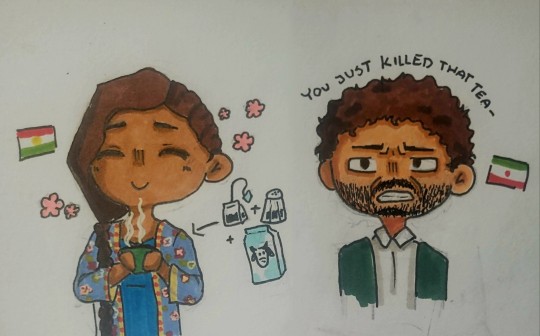
in Iran there's a saying "if you add milk to the tea you'll make her a widow"? And in central asia it's kinda contrary- salty tea with milk is kinda popular (and tbh I can totally see why, if you never tried it, you have to try). And as a honorary Turk, Tajikistan also drinks tea like that. So their father-daughter bonding moments must be difficult when it comes to drinks 🤭
#countryhumans but they are actually humans#hetalia oc#art#hws oc#countryhumans#countryhumans tajikistan#aph tajikistan#hetalia tajikistan#hws tajikistan#countryhumans iran#aph iran#hetalia iran#hws iran#drawing
23 notes
·
View notes
Photo

Nations of the Hindu Kush
[Afghanistan - Tajikistan - Pakistan]
#aph pakistan#hws pakistan#aph tajikistan#hws tajikistan#aph afghanistan#hws afghanistan#hetalia#hetalia oc#axis powers hetalia#Hetalia world stars#aph#hws#oc#ask blog#nations of the Hindu Kush#Hindu Kush is the name of the mountain range between Pak Afg and Tajik#This is my part in the calendar :) you can get it printed as well if you'd like#I hope you enjoy it!
217 notes
·
View notes
Text
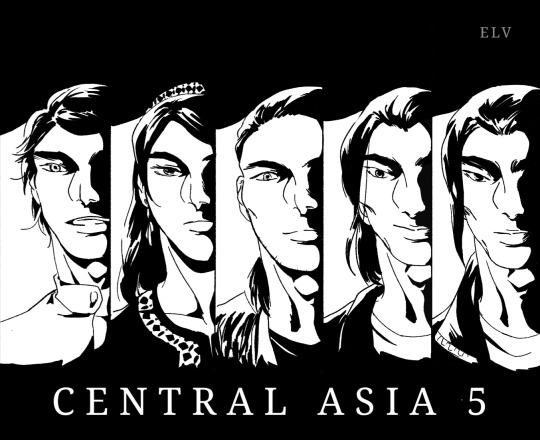
Central Asia nations (OC)
Tajikistan - Turkmenistan - Uzbekistan - Kyrgyzstan - Kazakhstan
Kyrgyzstan - Born 8th century as Yenisei Kyrgyz Khaganate - Carefree but chaotic and unpredictable
Tajikistan - Born 8th century as part of Samanid Empire - The only Persian among Turkic siblings - Sweet but scary sometimes
Turkmenistan - Born 10th century as part of Seljuk Empire - Most closed off, leaves the boys on read in chats and mutes group chats
Uzbekistan - Born 1428 as Uzbek Khanate - Most social and hospitable, knows everything from where you are from until what names your pets have
Kazakhstan - Born 1465 as Kazakh Khanate - Because he's the most successful he's relied upon a lot by his siblings and neighbors, so he sometimes feels he's the eldest among them - Definitely not as put together as how he seems on the outside. In fact his productive and ambitious persona is also used to hide the turmoil in his heart
13 notes
·
View notes
Text
New Post has been published on Trekking in Pakistan
New Post has been published on http://bit.ly/2ubCuFG
Chilinji An and Qalander Uween

Duration 6 days Distance 57km Standard Very demanding, technical Season Mid-June-September Start Baba Ghundi Ziarat Finish Bort Zone and Permit restricted, US$50 permit Public Transport finish only Summary Cross a challenging glaciated pass along Pakistan’s northernmost border between the dramatic and sacred landscape of Chapursan and the rocky walls and spires of the Karambar Valley.
Chilinji An somewhat confusedly refers to two distinct passes linking Chapursan with the Karambar Valley to its west: the true Chilinji An (5160m); and the Chilinji An North, known as Qalander Uween (5220m) to people from Chapursan. (Qalander means ‘an ascetic wanderer’ in Urdu, and Uween, a ‘pass’ in Wakhi.) The east sides of these passes are glaciated, whereas the west sides are steep, generally dry, scree.
Trekkers going from east to west typically cross the true Chilinji An, the pass crossed by early 20th– century explorers such as British archaeologist Aurel Stein, HW Tilman and Wilfred Thesiger. Trekkers going from west to east usually cross the Qalander Uween, although many of them mistakenly think it’s true Chilinji An. (That said, it’s possible for strong parties to cross the true Chilinji An from west to east, although no high camp is set.) The descriptions for both routes follow. Only previously acclimatized trekkers should attempt crossing from east to west.
The Chilinji An frequently precedes the Karambar An and Darkot An trek (p) by crossing to the Karambar River’s true right bank at Chilinji An on Day 5 and heading up the Karambar Valley. The Qalander Uween is often combined with the Broghil and Karambar An trek (p).
PLANNING
What to Bring
Mountaineering equipment necessary for travelling in roped teams in required (see Mountaineering Equipment, for a discussion of appropriate gear).
Maps
The Swiss Foundation for Alpine Research 1:250, 000 orographical map Karakoram (Sheet 1) covers the trek. The map shows the Chilinji An, but its actual coordinates are 36° 47.7” N and 74° 03’ 51.8” E. It gives inaccurate place names and locations. In particular, Biatar, an important camp, is along the true left bank of the river flowing east from the passes. The glacier on the east side of the Chilinji An, above Biatar, isn’t labeled. In the trek description, it’s referred to as the Biatar Glacier, because the glacier on the west side of the pass is the actual Chilinji Glacier. No maps depict the Qalander Uween, whose coordinates are 36° 48’ 08.8” N and 74° 03’ 41.1” E, nor the route over it.
Permits and Regulations
This trek is in a restricted zone where a permit and licensed guide are required (see Trekking Permits, for futher information). Bring multiple photocopies of your permit, which you may be asked to give to the army at Baba Ghundi Ziarat and the police in limit.
Baba Ghundi
Baba Ghundi Ziarat, Hunza’s most important shrine (Ziarat or astan), draws pilgrims from as far as Baltistan. The current shrine, built in 1924 by Hunza’s Mir Ghazin Khan, houses the tomb of the saint and his wife, along with the saint’s sword. Baba Ghundi came to Chapursan from Ghund, a valley in what is today’s Tajikistan. He performed numerous miracles throughout Chapursan, each commemorated by a small shrine. The shrine of Panja Shah, just before Yarz Rich, has many coloured flags. Inside is a rock with three long scrape marks, as though made by claws. The saint is said to have made these marks, and ghee is poured on them as an oblation. Kermin has a shrine, as does Reshit, where a rock bears the imprint of the saint’s fist and horse whip. Baba Ghundi’s main miracle is a tale of sin and retribution, very similar to other legends in Pakistan and Kashmir. When Baba Ghundi first came to Chapursan, it was a fertile, wealthy valley where the people lived in sin. He went from house to house, asking alms, but only one old woman offered him food. Angry at the villagers, but pleased with the old woman’s devotion. Baba Ghundi told here to leave her house and climb the hill. As she did, she saw Baba Ghundi riding at the head of a great flood that wiped out the valley and its people in punishment for their sinful ways. Evidently, a great outburst flood From the Yishkuk Glacier actually did cover most of the valley with boulders and mud as far down as Kampir Dior village, where the remains of the old woman’s house are visible today.
Baba Ghundi is also remembered as a dragon slayer. West of Zood Khun is Ravai Zhui, a lake in which lived a dragon that terrorized the villagers. The saint killed the dragon and ‘dragon’s bones’ are still found today in the dry lake bed. Today, Baba Ghundi’s main blessing is to bestow children on childless couples. The time for pilgrimage to his shrine is late September and early October, when religious songs are sung throughout the night. Goats are offered with prayers, and the meat is distributed, imbued with the barakat, or spiritual power, of the saint. Throughout the year, pilgrims arrive on Thursday to offer prayers on Friday. Close to the main shrine, near the river, is a spring decorated with ibex horns; its mineral water, called ab-e-shafa, bestows health on those who drink it.
Guides and Porters
Chapursan porters ask for a flat rate per stage, including payment for food rations. They also ask for the clothing and equipment allowance. Hire someone from Chapursan who knows the route if your guide doesn’t know it. When you trek from east to west, you use Chapursan porters. Having Wakhi porters opens doors for you in areas where their relatives live. When trekking from west to east, you mostly likely use Chitrali porters who are allowed to carry loads to Baba Ghundi Ziarat, from where they walk back to Chitral.
Some trekking companies have set a precedent to pay ‘drop’ fees to porters who travel by vehicle from their village to Baba Ghundi Ziarat. Since the porters carry no load and you already pay for their transportation, it makes no sense to pay an additional ‘drop fee.
Stages
It totals eight stages from Baba Ghundi Ziarat: (1) Yarz Yarz; (2) Biatar; (3) Chilinji An Base Camp; (4) Chilinji An; (5) Jungle Camp; (6) Maturamdan; (7) Yazben; and (8) Bort.
When travelling with Chitrali porters over Qalander Uween, the stages between Jungle Camp and Baba Ghundi Ziarat are: (1) Qalander Uween High Camp; (2) Biatar; and (3) Baba Ghundi Ziarat.
GETTING TO/FROM THE TREK
To the Start
Chapursan is beyond the Afiyatabad check post, so immigration officials ask to see your passport. The 70km drive between Afiyatabad and Baba Ghundi Ziarat takes four hours, three hours to Zood Khun, and another hour to Baba Ghundi Ziarat. Usually several jeeps, vans or pick-up trucks depart Afiyatabad every afternoon, shortly after the daily NATCO bus from Gilgit arrives. Most vehicles go only as far as Zood Khun. Afiyatabad- Baba Ghundi Ziarat special hires; Afiyatabad-Zood Khun, Zood Khun- Baba Ghundi Ziarat. Alternatively, it’s two stages to walk the 10km along the road between Zood Khun and Baba Ghundi Ziarat. When you take porters in a vehicle, pay them only for Stages over which they carry a load.
The grassy expanse at Baba Ghundi Ziarat offers ample room to camp. Spend one or two nights here to acclimatize and visit with Wakhi and Qirghiz from Afghanistan’s Wakhan Corridor who come to Baba Ghundi Ziarat to trade livestock for supplies such as flour, tea and salt. Springs are across the footbridge in the river’s true left bank.
From the Finish
The road goes as far as Bort, but in summer high water may block the road at Bilhanz. When it’s blocked, walk along the road, fording side streams as needed. It takes four hours to walk between Bort and Bilhanz. One stage is fixed between Bort and Bad Swat. You may have to pay for an additional partial stage between Bad Swat and Bilhanz.
Jeeps to Gilgit from Bort, from Bilhanz and from lmit. Special hires from Bort, from Bilhanz and from Imit. Alternatively, you can take a jeep to Chatorkhand or Gakuch and get on a NATCO bus to Gilgit there.
THE TREK
CHILINJI AN Day 1 : Baba Ghundi Ziarat to Yarz Yarz
2 hours, 5.4km, 140m ascent
From Baba Ghundi Ziarat (3660m), cross the footbridge and walk one hour on a good trail to the footbridge over Sekr Zherav (red stream). Across the Chapursan River to the south are the huts at Shpod Kut (rhubarb on the roof), labeled Shikarkuk on the Swiss map. Continue another hour to Yarz Yarz (3800m). This once-fine juniper (yarz) stand has been decimated for firewood and timber. Huts are on either side of a small clear stream with room for a few tents.
Day 2 : Yarz Yarz to Biatar
3 hours, 7km, 220m ascent
Twenty minutes along the alluvial fan, reach the base of a reddish cliff called Besk Rui. A small camp site here is called Besk-e-Ben. A large camp site called Targeen is below, along a clear stream lined with tamarisks (targ) just before the Kuz Glacier’s terminus. The trail works up the cliffs 45 minutes, easing off near the top of (3900m), then contours 15 minutes to Jamal Ilga (3810m), a livestock pen and several huts below the trail to the south. From here, another trail leads north to Zhui Werth (mill-stone by the lake) and Irshad Uween, a pass on the Afghan border.
Thirty minutes beyond Jamal Ilga, a stream bars the trail where a footbridge washed away. Descend onto the Kuz (shady) Glacier and cross the lateral moraine to avoid fording the deep, swift stream that disappears under the glacier. The trail continues along this stream’s true right bank another hour to the huts and livestock pen at Biatar (4020m) with large, clear springs and grassy camp sites amid boulders.
Day 3 : Biatar to Chilinji An Base Camp
3½-4 hours, 4.6km, 600m ascent
Ascend the rocky pasture directly above Biatar 45 minutes to the base of a large cliff on the valley’s east side. The Biatar Glacier, which descends from Chilinji An, fills the valley. Follow a faint trail 30 minutes to the top of the Biatar Glacier’s lateral moraine (4260m). Cross the glacier over terminal moraine, fording a glacial stream flowing over ice. Reach the ablation valley on the glacier’s west margin, where yaks graze, in 45 minutes. Late in the season, water is scarce. Ascend the ever-narrowing ablation valley 1¾ hours, climbing steadily to reach Chilinji An Base Camp (4620m), with four tent platforms and five rock circles. Water comes from a nearby snow bank. This camp site has same rock-fall danger.
Day 4 : Chilinji An Base Camp to Jungle Camp
5-6 hours, 7km, 540m ascent, 1560m descent
Walk up the crest of the moraine to a large cairn, which marks the high camp for trekkers coming from west to east. Follow the lateral moraine one hour along the glacier’s north margin. As the moraine diminishes and bends right, cross on to the level snow-covered glacier. The pass is directly ahead. Head towards the yellowish crag that marks the north side of the pass. Some medial moraine descends from this crag. Follow this moraine a short way, until one hour after coming onto the glacier you encounter black moraine and the slope steepens to 30 degrees. From this point, travel in roped teams. Head up the middle of the glacier towards the pass, zigzagging to avoid numerous crevasses. Reach the tall cairn marking Chilinji An (5160m) in one hour.
Put away your rope and head down scree, traversing north (right) to a small ridge. Follow the crest of this ridge 10 to 15 minutes until you can descend right on scree to the valley below. A few small tent platforms (4560m) on rock are near a clear stream. The 600m scree descent takes 45 minutes.
Follow the stream over very steep, loose scree. Be careful of rock fall. It takes one hour to descend almost 1000m of scree to the gentler slopes and forest below. Head for the lateral moraine of the Chilinji Glacier 15 minutes ahead through dense willow and birch. In this lovely ablation valley, stop near the obvious bend in the clear stream. This forested site is called Jungle Camp (3600m).
Days 5-6 : Jungle Camp to Bort
2 days, 33km, 872m descent
Follow the stream through the forested ablation valley, crossing it several times. Tall junipers grow farther down this enchanting sheltered valley, and a waterfall cascades from cliffs above. After one to 1½ hours, you reach the Gujar settlement of Chilinji (3450m) along the Karambar River’s true left bank.
Head down the Karambar Valley camping at Maturamdan on Day 5 en route to Bort (see Days 1-3 of the Karambar An and Darkot An trek, for details in the reverse direction).
THE TREK
QALANDER UWEEN Days 1-3 : Bort to Jungle Camp
3 days, 33km, 872m Ascent
See Days 1-3 of the Karambar An and Darkot An trek (p) for details, but on Day 3 leave the Karambar Valley above Waraghut by crossing the cable to the river’s true left bank at Chilinj and continue 3km to Jungle Camp (3600m).
Day 4 : Jungle Camp to Qalander Uween High Camp
3-4 hours, 3.4km, 1110m ascent
The trail heads up the vegetated slope dotted with blue salvias and other wildflowers. Continue past the highest willows and after 30 to 45 minutes head right into a steep, narrow canyon. Follow the stream bed, using the boulder as irregular stairs, one hour to the top of the ravine, where the angle eases (4560m). A clear steam flows across black scree on the right, and the trail from the true Chilinji An is visible on the scree above. Continue upvalley, working left onto light-coloured moraine, another two to 2½ hours to the valley’s head. A cairn, tent platforms and stone porters’ shelters mark the Qalander Uween High Camp (4710m). A small stream provides water.
Day 5 : Qalander Uween High Camp to Biatar
7-8 hours, 8.2km, 510m ascent, 1200m descent
Ascend a faint trail up the obvious steep scree slope 1½ to two hours to Qalander Uween (5220m). Near the top, pass the right of a large rock outcrop. The angle approaches 50 degrees as you near the pass, necessitating use of a trekking pole, taking care to avoid knocking rock onto those below. A small cairn marks the pass. Descend right to rock at the edge of the névé. Travel in roped teams as you descend the centre of the 10- to 15-degree névé field, working left towards the rock wall on the glacier’s left margin probing for hidden crevasses. Exit the glacier’s left margin into the rocky ablation zone 1½ to two hours from the pass. Descend steeply on the left side of the massive icefall from the upper glacial basin into the Biatar Glacier. Looking back, it’s hard to imagine a relatively easy route exists above the imposing icefall. Continue down the Biatar Glacier’s left margin. The route to the true Chilinji An is clearly visible back up the centre of this glacier. Pass the Chilinji An Base Camp and continue another hour down the ablation valley. Then cross the glacier above its terminus, fording its outwash stream to its true right bank. Follow a trail down to Biatar (4020m).
Day 6 : Biatar to Baba Ghundi Ziarat
5 hours, 12.4km, 360m descent
See Days 1-2 of the Chilinji An and Qalander Uween trek (p) for a description in reverse.
0 notes
Note
Any hcs for Kyrgyzstan?
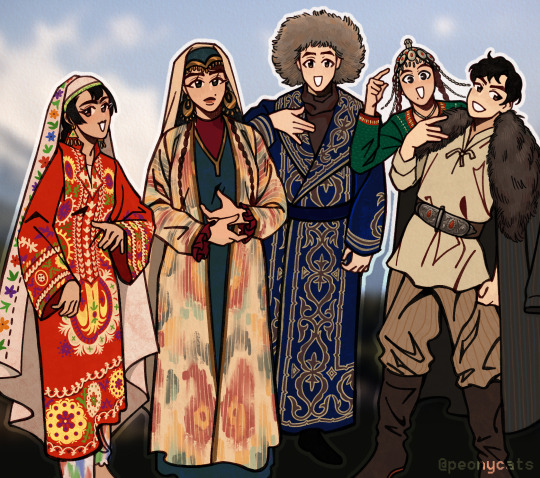
This made me realize I never posted this over here LMAO central asia gang gang!!!
some headcanons
Token twink boytoy of the group...
Most Likely to Throw Hands With Russia Champion of the Central Asians for 10+ years running
Nature Boi
Complains @ kazakhstan that he's too nice to Russia all the time
actually he kinda has a complicated relationship with kazakhstan in general...
Nobody knows if he's actually like the Yenisei Kyrgyz
Perceived to be the "wildest" of CAsia which may or may not have some basis in truth lmao
BONUS:
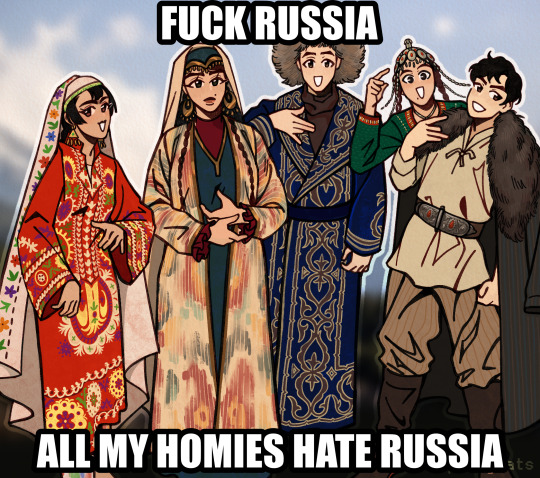
#ask#anonymous#hetalia#hws kazakhstan#hws kyrgyzstan#hws uzbekistan#hws tajikistan#hws turkmenistan#historically inaccurate hair is historically inaccurate#hetalia headcanons#hetalia ocs#aph kazakhstan#aph kyrgyzstan#aph uzbekistan#aph tajikistan#aph turkmenistan
233 notes
·
View notes
Text

tajikistan is done!! sorry he took kind of long to create, every iteration i came up with resembled an already existing hetalia characters and i kind of wanted him to be unique. even this design feels a little unoriginal tbh...
due to his persian background, tajikistan doesnt really spend time with the rest of central asia and prefers to hang around iran and afghanistan. despite his stern look 24/7, he really enjoys messing with his turkic peers
17 notes
·
View notes
Text
for @hwsasiaweek day 2: uzbekistan + food + "a smooth sea never made a skillful sailor"
in which uzbekistan can't let go of her qazon and explains why
‧₊˚✧[🇰🇿🇺🇿🇰🇬]✧˚₊‧
It was a Thursday afternoon, and all of Uzbekistan's siblings were staying at her house for a week in preparation for a regional conference.
While they were all in separate rooms of the house working on writing up important documents and presentations, Uzbekistan was cooking food for the evening, and as per tradition she was cooking osh. It was also her siblings' favorite food, and they insisted she cook it for them almost every time they got together.
As she was stirring the beef and onions, Kazakhstan came out of her study, sniffing around.
"Apa, are you making osh for tonight?"
"Yes. it is a Thursday, after all! Also if you guys eat enough of my food, perhaps you won't all be so grumpy at the conference."
"Speak for yourself," he chuckled. There was always some argument that would arise at one of these conferences, and many times Uzbekistan and Kyrgyzstan would be part of it.
Before she could respond with some lackluster excuse of those conflicts being in the moment and that it wasn't truly her and that she was definitely a mature lady and how he could say that to his dear older sister who is cooking food just for him, he points at the qazon she was cooking the osh in. the bottom was completely black after years of use.
"Hey, how long has it been since you've used this qazon?"
"Oh, um...I bought it at a market sometime around the 60s?"
"Apa, that's like 50 years!"
"Well, it's durable! Like the spatula I'm using to cook it with."
"But if you bought new ones...wouldn't it enhance the quality of your meals? New cooking technology and all..."
She gently added the chopped carrots to the qazon. "You know, a smooth sea never made a skillful sailor. You could buy all the latest utensils and completely revamp your kitchen, but!" She gestured at her hands. "It's all about your experience. Your skill. That's why you all love my food the most!"
"I don't know..." Kyrgyzstan stood on his tiptoes and looked over Kazakhstan's shoulder." Tajikistan was gushing about my dymdama last time. Her side of the plate was so clean, I think she used bread to wipe the leftover broth up."
"Why must you always make this about you? She was extremely hungry that time! Besides, that was then, and this is now." She closed her eyes briefly and tossed the carrots over.
The two spent the rest of the time bickering about the "deliciousness scores" that they had apparently been tallying up so far based on their other siblings' opinions of their food, while Kazakhstan tried his best to mediate.
Good practice for the actual conference I guess, he thought, though they've done this enough times I don't think I really need practice...
"If we're gonna talk about revamping your cooking, why don't you use a frypan next time? Your boyfriend already does that when he cooks osh-"
"HE DARE COMMIT SUCH BLASPHEMY?"
"Hey chill! You better keep that a secret cuz he told me to keep it a secret from you!"
Kazakhstan had to admit, she was pretty skilled at cooking. He could see it in the way she both argued passionately with their older brother and added the chickpeas and rice to the osh, never missing a step. Heck, she even managed to make some salad on the side as well.
And when the sky became a light purple and the crickets began to chirp, the evening wind brushing through their hair as they ate outside on the tapchan, Uzbekistan brought the hot, aromatic osh to the table to eat. Everyone cleared the plate within half an hour. She smiled smugly at Kyrgyzstan.
"That's 25 points for me since today, and you're still at 22~"
"I'M CATCHING UP, OKAY?!"
‧₊˚✧[🇰🇿🇺🇿🇰🇬]✧˚₊‧
notes: ALHAMDULILAH I MADE IT IN TIME ITS STILL 11:57 PM 💪💪💪
there's a lot of uzbek/central asian terminology here, and they're italicized:
osh: otherwise known as plov, it's uzbekistan's national food. it's a sort of fried? rice with carrots, meat, chickpeas, and raisins. each region in uzbekistan cooks it differently, but I tried my best to describe whatever I can remember from my mom's way. it's served to guests at home, weddings, and also eaten on the regular weekly, with osh being eaten on thursdays as a traditional custom.
qazon: the best way I can describe this in english is a cast iron cauldron. it's quite big and a lot of things can be cooked in it, like osh, qazon kabob, and dymdama.

apa: kazakh for "older sister."
dymdama: eaten in many central asian countries, it's a stew of beef, potatoes, carrots, tomatoes, and other vegetables. in uzbekistan, it's called dimlama, and I only recently found out it's called dymdama in kyrgyzstan by a kyrgyz classmate!
tapchan: in a lot of uzbek houses with backyards, there's a small resting area with cushions and a table outside. in the spring and summer, families usually eat their breakfast, lunch, and dinner outside.

#hetalia#aph uzbekistan#hws uzbekistan#nargiza yusufqizi#aph kazakhstan#hws kazakhstan#aph kyrgyzstan#hws kyrgyzstan#aph tajikistan#hws tajikistan#tokki writes#just a quick thing i felt like writing! a big part of uzbek culture is the food and i wanted to make it feel as homely as possible#especially since i dont write the other central asians as much as i should!#hwsasiaweek2024#hwsasiaweek
17 notes
·
View notes
Text
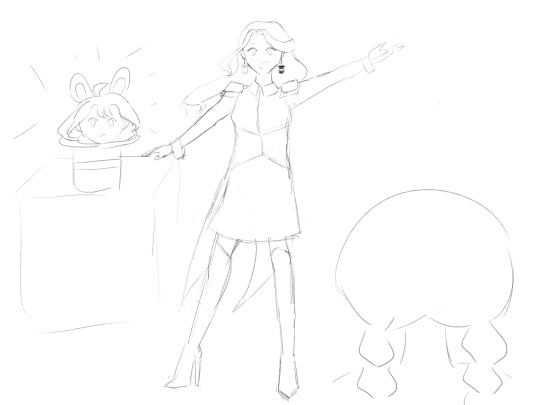
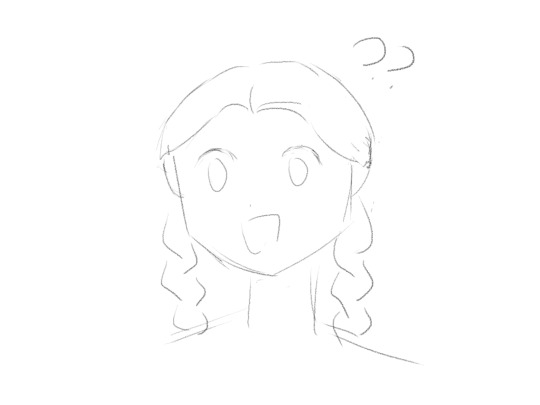
i like to think I'm good at magic tricks!
(turkmenistan was so shocked she couldn't talk for a day)
#aph uzbekistan#hws uzbekistan#aph tajikistan#hws tajikistan#aph turkmenistan#hws turkmenistan#hetalia
8 notes
·
View notes
Text
AHSHDJDB???
One of the central asians walk into kyrgyzstan's room like "heyy what are you writing" and he bares his teeth like a wolf 💀💀
Kyrgyzstan in his fucked up little journal: This Russia is the nastiest skank bitch I've ever met. Do not trust him. He is a fugly slut.
22 notes
·
View notes
Text
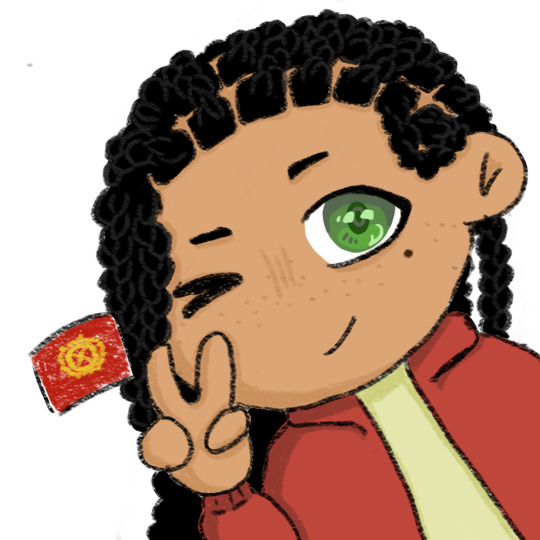
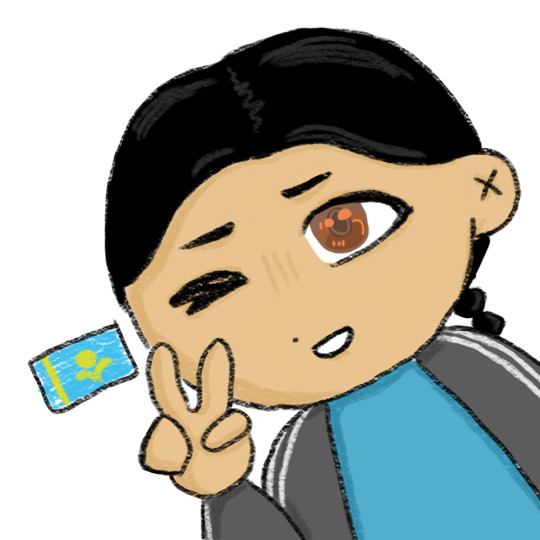
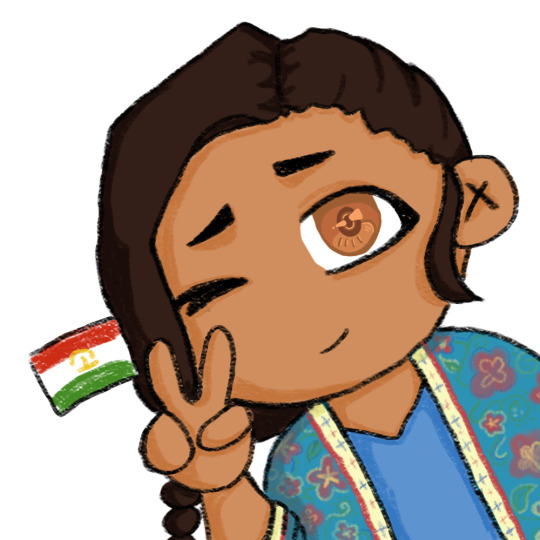
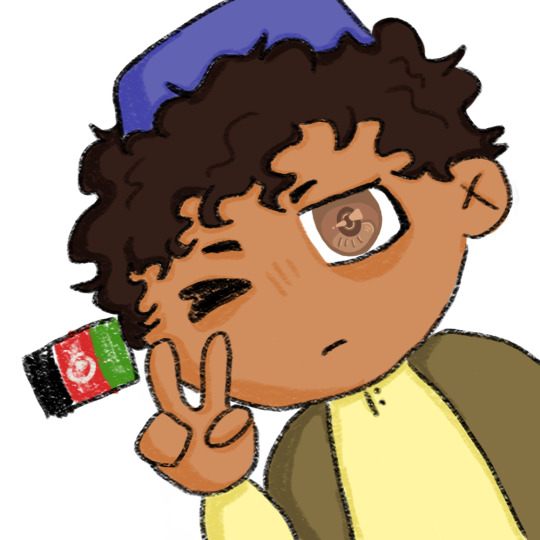
So I think it's the high time to show you all my characters.
Starting with this four. My lovely central Asian non-men. All of them could kill you, but 3 of them are too nice to do it without a good reason. I don't think it's hard to recognise the special snowflake.
(I lohe Afghanistan, he's just traumatised)
Kyrgyzstan 🇰🇬 - Ainura Kyrgyzsevna
Kazakhstan 🇰🇿 - Eldana Qunanbaiuly
Tajikistan 🇹🇯 - Mahtab (surname still in progress tho I think I'll stick with Shahfar)
Afghanistan 🇦🇫 - Mehr Balkhi (he/they, because they're bacha push!)
#countryhumans but they are actually humans#countryhumans#hetalia oc#art#hws oc#countryhumans tajikistan#aph tajikistan#hetalia tajikistan#hws tajikistan#hetalia Kyrgyzstan#hetalia kazakhstan#aph kazakhstan#hws kazakhstan#hws Kyrgyzstan#hws Afghanistan#hetalia Afghanistan#aph Afghanistan#countryhumans kazakhstan#countryhumans Afghanistan#countryhumans Kyrgyzstan
12 notes
·
View notes
Note
Salam OP! Loved the nyo featuring Meharbano becasue she appeared so elegant and I would assume she has a reserved personality (well-respected). What would the male equivalent of Tajikistan look like. PLEASE draw the conjoined eyebrow.
She's sweet and anxious! A bit of a nervous wreck at times. :''0 Meherbano is a certified cinnamon bun in my eyes and must be protected at all costs!
I've actually drawn somewhat of a concept art regarding Nyo Tajikistan (and wink wink i added the unibrow!), it's not final, but what do you think? :0

#ooc#answered ask#thanks for asking#hetalia#oc#hetalia oc#aph tajikistan#hws tajikistan#nyo tajikistan#axis powers hetalia#hetalia world stars#aph#hws#concept art#sketch
33 notes
·
View notes